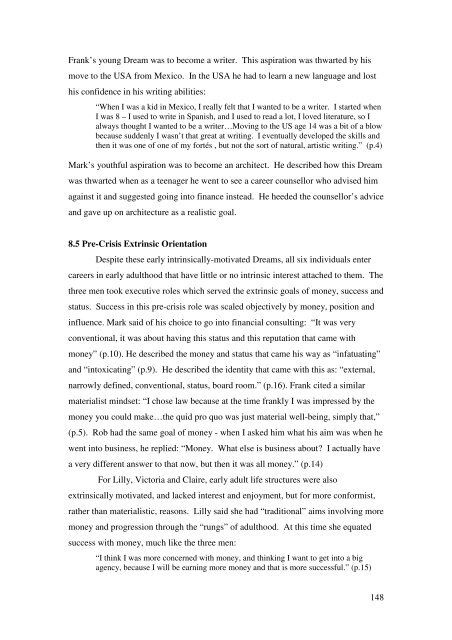DEVELOPMENTAL CRISIS IN EARLY ADULTHOOD: A ...
DEVELOPMENTAL CRISIS IN EARLY ADULTHOOD: A ...
DEVELOPMENTAL CRISIS IN EARLY ADULTHOOD: A ...
You also want an ePaper? Increase the reach of your titles
YUMPU automatically turns print PDFs into web optimized ePapers that Google loves.
Frank’s young Dream was to become a writer. This aspiration was thwarted by his<br />
move to the USA from Mexico. In the USA he had to learn a new language and lost<br />
his confidence in his writing abilities:<br />
“When I was a kid in Mexico, I really felt that I wanted to be a writer. I started when<br />
I was 8 – I used to write in Spanish, and I used to read a lot, I loved literature, so I<br />
always thought I wanted to be a writer…Moving to the US age 14 was a bit of a blow<br />
because suddenly I wasn’t that great at writing. I eventually developed the skills and<br />
then it was one of one of my fortés , but not the sort of natural, artistic writing.” (p.4)<br />
Mark’s youthful aspiration was to become an architect. He described how this Dream<br />
was thwarted when as a teenager he went to see a career counsellor who advised him<br />
against it and suggested going into finance instead. He heeded the counsellor’s advice<br />
and gave up on architecture as a realistic goal.<br />
8.5 Pre-Crisis Extrinsic Orientation<br />
Despite these early intrinsically-motivated Dreams, all six individuals enter<br />
careers in early adulthood that have little or no intrinsic interest attached to them. The<br />
three men took executive roles which served the extrinsic goals of money, success and<br />
status. Success in this pre-crisis role was scaled objectively by money, position and<br />
influence. Mark said of his choice to go into financial consulting: “It was very<br />
conventional, it was about having this status and this reputation that came with<br />
money” (p.10). He described the money and status that came his way as “infatuating”<br />
and “intoxicating” (p.9). He described the identity that came with this as: “external,<br />
narrowly defined, conventional, status, board room.” (p.16). Frank cited a similar<br />
materialist mindset: “I chose law because at the time frankly I was impressed by the<br />
money you could make…the quid pro quo was just material well-being, simply that,”<br />
(p.5). Rob had the same goal of money - when I asked him what his aim was when he<br />
went into business, he replied: “Money. What else is business about? I actually have<br />
a very different answer to that now, but then it was all money.” (p.14)<br />
For Lilly, Victoria and Claire, early adult life structures were also<br />
extrinsically motivated, and lacked interest and enjoyment, but for more conformist,<br />
rather than materialistic, reasons. Lilly said she had “traditional” aims involving more<br />
money and progression through the “rungs” of adulthood. At this time she equated<br />
success with money, much like the three men:<br />
“I think I was more concerned with money, and thinking I want to get into a big<br />
agency, because I will be earning more money and that is more successful.” (p.15)<br />
148
















